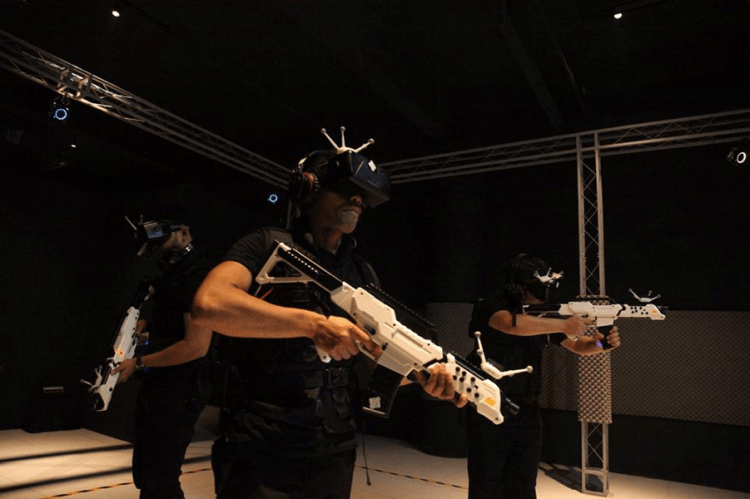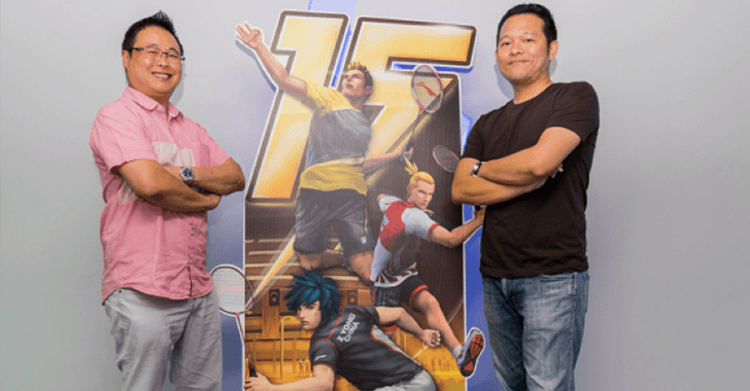
VR gaming in the Angkas Zone at EXA Outpost, Kuala Lumpur. Photo credit: Havson Group.
In Southeast Asia, there are more and more opportunities to shop online, from the comfort of home or the convenience of the office desk. One no longer has to spend hours traipsing around malls – which may come as a relief to many shoppers (this one included!), but presents a big problem for retailers.
But virtual reality (VR) entertainment startup Havson Group thinks it may have found a way to make going to the mall a more tempting proposition.
The Kuala Lumpur-based company has just secured funding from 500 Startups to introduce its VR platform to shopping malls, theme parks, and family entertainment centers (FECs – in other words, venues like gaming arcades, bowling alleys, jungle gyms, and so on).
Havson produces VR content and free-roam VR gaming tech that allows gamers to move about freely. It’s also building tech to address motion sickness and latency issues that often affect users.
Havson recently launched EXA Outpost, a VR gaming studio in the Malaysian capital that resembles an indoor laser-tag arena, but in which participants wear VR gear enabling them to game in a virtual world.
The company’s founders Havene Liew and Rayson Wong realized that their VR solution could assist business owners in industries outside of gaming itself. They figured that the ability to utilize limited spaces to offer VR entertainment experiences could help increase footfall in shopping malls, traditional theme parks, and FECs – businesses that have generally been seen as being on a downward trend in Southeast Asia, according to Liew and Wong.
Havson will charge venue owners upfront for rolling out the VR service. The startup will from then on share in profits that the services generate. It’s targeting further expansion in Southeast Asia, China, and the United States.

Havson Group founders Rayson Wong (L) and Havene Liew (R). Photo credit: Havson Group.
Liew – a former film director and game design lecturer – and Wong founded the startup that would eventually become Havson in 2012. Back then it was called Mediasoft, and it focused on developing mobile games. Among the titles it released were badminton game Jump Smash and the first-known mobile app version of the Southeast Asian sport of sepak takraw (kick volleyball).
While it appears to be the first to offer such solutions regionally, Havson faces numerous competitors on a global scale. Among these are The Void, a provider of VR gaming centers which has bases in New York and Utah in the United States, as well as Dubai. Melbourne-based immersive VR studio Zero Latency has raised as much as US$8.95 million in seed and venture funding from investors including Carthona Capital. Dreamscape Immersive, which has received US$11 million in a funding round led by Bold Capital, is currently establishing a VR Multiplex in Los Angeles.
In China, there are a multitude of players in VR entertainment. Video streaming sites Youku and iQiyi have their own VR platforms, while VR content producers like Sandman Studios are looking at partnering with filmmakers, cinemas, and gaming arcades.
Canadian cinema technology company Imax is another competitor in the space. It is planning to open a number of VR centers in countries including China, Japan, and the United Kingdom, as well as in the Middle East and Western Europe.
This post Malaysian startup gets funding to lure shoppers back into malls with virtual reality appeared first on Tech in Asia.
from Tech in Asia https://www.techinasia.com/havson-funding-500
via IFTTT
No comments:
Post a Comment